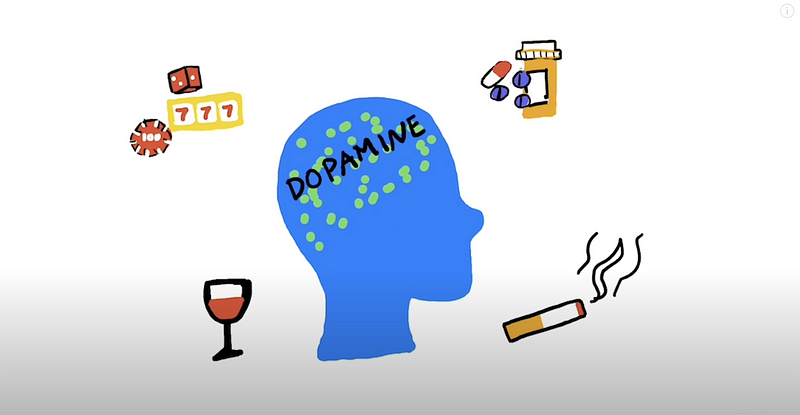Navigating Dopamine Addiction: The Impact of Social Media
Written on
Chapter 1: Understanding Dopamine and Its Influence
In recent discussions around attention deficit hyperactivity disorder (ADHD), a growing concern is its potential link to the pervasive use of social media. Platforms like Instagram and TikTok, characterized by their quick and varied content, consistently stimulate dopamine release in users' brains. This raises the question: could our digitally saturated environment filled with continuous stimuli exacerbate attention-related issues? This article delves into the connection between social media and dopamine dependency, examining the possible repercussions of this relationship on attention disorders.
Dopamine plays a significant role in our daily existence, affecting our brains, emotions, and even our choices. This neurotransmitter is integral to our reward system, activated during pleasurable experiences, goal achievements, or enjoyable activities, allowing us to feel happiness and fulfillment.
Our connection to dopamine is deeply rooted. From the moment we are born, dopamine released during bonding with caregivers initiates an emotional attachment process. This means that our relationships may even hinge on our experiences with dopamine!
Daily activities, such as savoring delicious food, exercising, spending time with friends, achieving goals, enjoying music, appreciating art, shopping, helping others, and participating in thrilling activities, all stimulate dopamine production in the brain, providing a rewarding sensation. However, it is crucial to approach these activities with balance to prevent addiction and negative consequences.
What is Dopamine Addiction?
Dopamine addiction occurs when individuals become overly reliant on activities that consistently trigger high dopamine levels. This addiction typically emerges from the excessive and uncontrolled engagement in activities driven by the brain's reward system.
For instance, spending prolonged periods on social media platforms like Instagram or TikTok, which bombard the brain with rapid content, significantly heightens the risk of dopamine addiction. Consuming this content for hours enables our minds to shift focus every 30 seconds, akin to the adrenaline rush experienced when our ancestors evaded predators.
The internet, social media, vivid visuals, loud music, fast-paced activities, and extreme sports are all relatively new experiences for many. Our brains, shaped over millennia, struggle to adapt to these innovations, even those rooted in childhood memories.
When we gaze at a glowing screen, it captures our attention, much like how our ancestors were mesmerized by fire. Our brains become overwhelmed by these modern distractions.
Each search for more happiness, excitement, or thrilling content resembles the pursuit of a drug addict looking for their next high. We continuously seek more captivating partners, exhilarating experiences, and endless entertainment, resulting in an unending quest.
Ultimately, this pattern leads us to a point where we find little joy in life, where nothing seems satisfactory, and where hobbies are abandoned shortly after they begin. Boredom feels like a distant memory.
At this juncture, it's essential to pause and allow our minds to rest. We realize that boredom is harmless, and we can exist without constant stimulation. In fact, embracing these moments of stillness can lead to profound insights.
Recognizing our potential dopamine addiction may prompt reflection. If you resonate with this notion, feel free to share your thoughts in the comments!
Overcoming Dopamine Addiction: Strategies for Balance
What actions can we take to combat this addiction and restore mental equilibrium? It's time to explore the concept of "dopamine detox."
Technology Detox
Limiting or entirely refraining from social media, video games, and other digital activities for a designated period allows our brains to detox from excessive stimulation.
Balanced Nutrition
Reducing sugar and processed food intake while focusing on healthy fats, proteins, and fiber-rich foods can positively influence brain health.
Exercise
Engaging in regular physical activity naturally boosts dopamine levels, helping to balance brain chemistry and enhance mood.
Meditation and Yoga
Practices like meditation and yoga promote stress management, mental clarity, and relaxation, aiding in the regulation of dopamine levels.
Spending Time in Nature
Connecting with nature through walks or outdoor activities can rejuvenate the brain.
Strengthening Social Connections
Fostering real-life social interactions and deepening relationships can positively impact the brain's reward system.
Dopamine detox aims to create a more balanced lifestyle, aligning the reward system with individual needs. Everyone's journey is unique, and recognizing personal dopamine triggers is essential.
Consider reflecting on your sugar intake, screen time, and overly stimulating activities this week. Implementing these changes could help restore balance and redirect focus toward what truly matters in life.
If this article has motivated you to consciously manage your dopamine triggers this week, I would love to hear your experiences. Supporting my work can be as simple as leaving a comment or reaching out to me on Instagram at @bostanciselin or via email at [email protected].
Let today mark a moment of awareness regarding where our time and attention are directed!
With love,

This video discusses the addictive nature of dopamine and its implications on mental health.
Explore how social media addiction can negatively affect brain function and overall well-being.